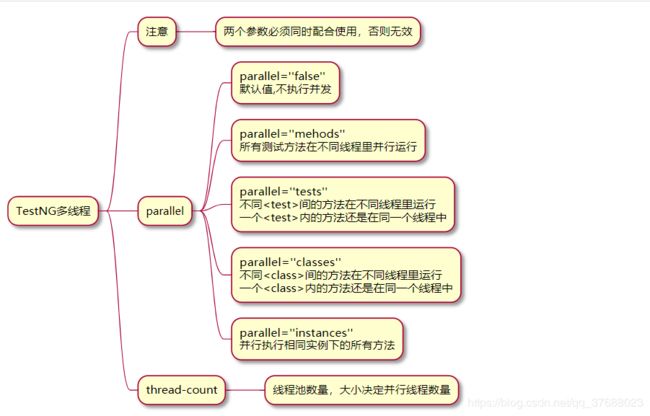TestNG多线程安全吗?ThreadLocal:有我还能不安全?
目录
- 一、背景介绍
- 二、TestNG多线程详解
- 2.1 TestNG多线程实现
- 2.2 TestNG多线程效果演示
- 三、ThreadLocal
- 3.1 ThreadLocal概念
- 3.2 具体实现
一、背景介绍
在使用Selenium+TestNG做WebUI自动化过程中,为了能够加快WebUI自动化测试的速度,减少测试执行时间。
利用TestNG多线程并发测试的特性,设置了对应的线程数的并发。这样一来,测试过程中就会创建多个driver,如何保证多个driver之间不相互影响?保证对浏览器1的操作不会出现在浏览器2上?所以就使用到ThreadLocal这个类去保证线程安全。
二、TestNG多线程详解
说到TestNG,就一般会拿TestNG与Junit来比较。但是在数据驱动、多线程并发测试这方面,TestNG自带这方面的功能,更加便捷;而Junit却需要三方工具来实现。
2.1 TestNG多线程实现
-
实现TestNG多线程最常见的一种方法为:testng.xml文件配置。我们可以在suite、test标签下设置parallel、thread-count属性的值。

-
实际案例:例如下面的suite有两个test,然后设置为parallel=“tests” thread-count=“2”,即为开启两个线程,并行执行,每个线程执行对应的下的所有方法。
2.2 TestNG多线程效果演示
- 创建Test1这个类
public class Test1 {
@Test
public void test1(){
long id=Thread.currentThread().getId();
System.out.println("test1.1 Thread id is:"+id);
}
@Test
public void test2(){
long id=Thread.currentThread().getId();
System.out.println("test1.2 Thread id is:"+id);
}
@Test
public void test3(){
long id=Thread.currentThread().getId();
System.out.println("test1.3 Thread id is:"+id);
}
}
- 创建Test2这个类
public class Test2 {
@Test
public void test1(){
long id=Thread.currentThread().getId();
System.out.println("test2.1 Thread id is:"+id);
}
@Test
public void test2(){
long id=Thread.currentThread().getId();
System.out.println("test2.2 Thread id is:"+id);
}
@Test
public void test3(){
long id=Thread.currentThread().getId();
System.out.println("test2.3 Thread id is:"+id);
}
}
- 创建testng.xml(不添加多线程并发参数)
运行testng.xml,输出结果如下。结论:每个测试方法输出的Thread id相同
test1.1 Thread id is:1
test1.2 Thread id is:1
test1.3 Thread id is:1
test2.1 Thread id is:1
test2.2 Thread id is:1
test2.3 Thread id is:1
- 修改testng.xml(添加多线程并发参数)
运行testng.xml,输出结果如下。
结论:每个test标签下的方法在同一个线程中执行。不同test标签下的方法所在线程不同。启动两个线程,一个线程负责执行test1这个中的方法,另一个线程负责执行test2这个中的方法,两个线程同时并行。
test1.1 Thread id is:11
test2.1 Thread id is:12
test2.2 Thread id is:12
test1.2 Thread id is:11
test2.3 Thread id is:12
test1.3 Thread id is:11
三、ThreadLocal
3.1 ThreadLocal概念
ThreadLocal类的相关概念可以参考:https://www.jianshu.com/p/6fc3bba12f38
Threadlocal是一个线程内部的存储类,可以在指定线程内存储数据,数据存储以后,只有指定线程可以得到存储数据。做个不恰当的比喻,从表面上看ThreadLocal相当于维护了一个map,key就是当前的线程,value就是需要存储的对象。
3.2 具体实现
具体实现可以参考我博客链接:https://blog.csdn.net/qq_37688023/article/details/105592464
- 封装ThreadLocalUtil类
public class ThreadLocalUtil {
/**
* 设置当前线程变量
* @param threadLocal 线程名
* @param value 线程的值
*/
public void setThreadValue(ThreadLocal threadLocal, T value){
if (threadLocal.get()==null ){
threadLocal.set(value);
}
}
/**
* 获得当前线程变量的值
* @param threadLocal 线程名
* @return 返回当前线程的值
*/
public T getThreadValue(ThreadLocal threadLocal){
return threadLocal.get();
}
}
- DriverBase类(封装产生driver,并提供相关方法)
@Slf4j
public class DriverBase {
/*声明一个driver对象*/
private WebDriver driver;
/*创建一个ThreadLocalUtil对象*/
private static ThreadLocalUtil driverThreadLocalUtil = new ThreadLocalUtil<>();
/*创建一个ThreadLocal对象*/
private static ThreadLocal threadDriver = new ThreadLocal<>();
public void test1(){
/* 省略代码 */
driverThreadLocalUtil.setThreadValue(threadDriver, new ChromeDriver(chromeOptions));
/* 省略代码 */
}
/**
* 获得driver
* */
public WebDriver getDriver(){
return driverThreadLocalUtil.getThreadValue( threadDriver );
}
/**
* 设置driver
* */
private void setDriver(WebDriver driver){
this.driver = driver;
}
/**
* 关闭driver
* */
public void stopDriver(){
setDriver( getDriver() );
setBrowseName( getBrowseName());
if(driver != null){
driver.quit();
log.info("成功关闭" + browseName + "浏览器");
/*最后通过remove方法去掉对应的线程组*/
threadDriver.remove();
threadBrowseName.remove();
}
}
}
- BaseTest类(实际调用相关方法)
public class BaseTest {
/*创建DriverBase对象*/
public static DriverBase driverBase = new DriverBase();
/*创建driver对象*/
public WebDriver driver;
/* 省略代码 */
/**创建指定浏览器的driver对象/
driverBase.randomOpenBrowse(browseNumber, remoteIP, browserVersion);
/* 省略代码 */
/*获取对应driver*/
driver = driverBase.getDriver();
}